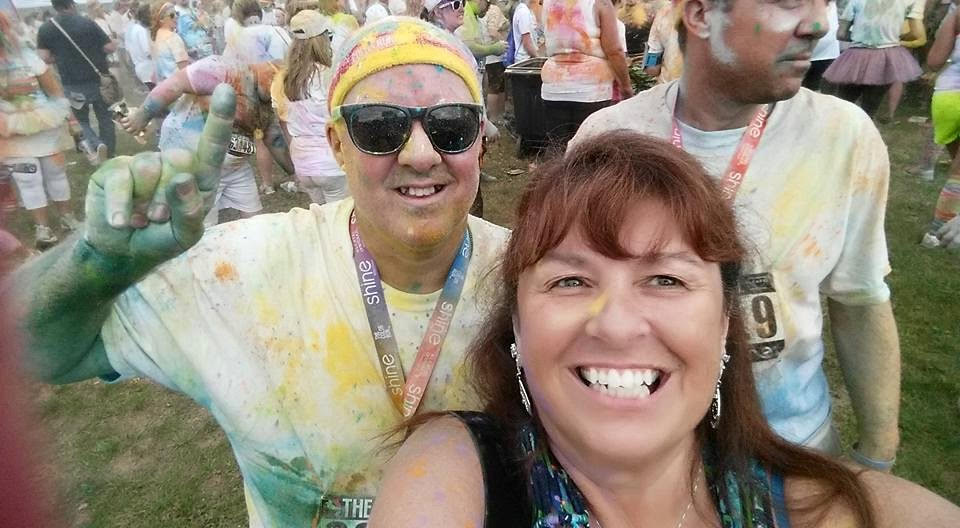Tamar and David share their vestibular journies to show how the brain and vision are integrally related to vestibular dysfunction.By Tamar Schwartz & David Morrill
(Introduction by Tamar) My friend, David Morrill, is the Chair of the Ambassador Board for the Vestibular Disorders Association. We both have combo (i.e. multiple) diagnoses. He has permanent brain damage due to a stroke, and I have a vision disorder. Both of these issues impact our balance system, because balance comes not JUST from the inner ear, it ALSO involves your brain and eyes. It is very important that all three of these parts work properly for balance to be achieved and maintained. We decided to present our stories together to highlight how each part of this system works independently and together. David and I are very grateful that we are able to share our stories; we both feel it’s very important for people to have as much info as possible so an accurate, complete diagnosis can be achieved!
David’s story
 Although my disorder is somewhat new to me, I have taken time to learn about vestibular disorders, and to listen to personal stories about the daily struggles of people with these types of disorders and what they deal with on a daily basis. My personal story is slightly different than most other vestibular stories. First, you may be wondering, what can he be talking about, what is a vestibular disorder? If you haven’t heard much about them, don’t feel bad, neither had I until one day my life was changed forever.
Although my disorder is somewhat new to me, I have taken time to learn about vestibular disorders, and to listen to personal stories about the daily struggles of people with these types of disorders and what they deal with on a daily basis. My personal story is slightly different than most other vestibular stories. First, you may be wondering, what can he be talking about, what is a vestibular disorder? If you haven’t heard much about them, don’t feel bad, neither had I until one day my life was changed forever.
The vestibular system includes the parts of the inner ear and brain that process sensory information involved with controlling balance and eye movements. If either area is compromised you will get a spinning or rocking feeling, almost like the earth is moving under your feet. It is very hard to walk, you may feel nauseous, it’s hard to focus on any one thing, and you may get confused. There are many more symptoms and a variety of different disorders. I would encourage everyone to get educated on the different symptoms and disorder types at vestibular.org.
As I said, my personal story is a little bit different than most vestibular stories. Most cases involve some type of problem with the inner ear. Most of you have heard of vertigo. This and many other problems can occur and make one’s balance compromised. My story starts a couple of years ago. I suffered a stroke in the left brainstem portion of my brain where a blood clot shut off blood flow to that section of my brain. This particular stroke affected my left cerebellum, which is the balance center of your brain. It took a lot of rehab, and help from family, community, and friends, as well as persistence and determination. I must say, compared to some stroke survivors, I am very lucky. My stroke didn’t take away my ability to walk, talk or reasonably use my brain. Because of the location of the stroke, doctors tell me it knocked out part of my vestibular system. They are not sure if it will ever come back completely. So my condition is I have dizziness and balance problems at all times. This makes it difficult to drive; I don’t feel I am a safe driver because I can get dizzy at any time. I am being treated with some medications that help relieve some of the symptoms, but I am still off balance most of the day.
After my stroke I was initially very angry – why me, and why now? Then I realized that if I put all my energy into helping others who have similar problems, or better yet, more research into prevention of these disorders, I could maybe turn this negative into a positive. That’s why I volunteer with VeDA and help Dr. David Newman-Toker in his research.
The core of my message is that your brain plays a vital role in your vestibular system, so any injury or trauma to the brain can potentially cause a vestibular disorder. Sometimes these disorders may not show up for several years after your injury. So make sure you are aware of how to properly protect your brain whenever possible. And most importantly, if you start to have dizziness or severe headaches, please seek immediate medical attention – it could save your life!
Tamar’s story
To Listen: Copy and paste into Google Translate and click on the “speaker” icon.
 When I got sick in September of 2011 I wanted to know what was wrong with me. Getting sick was not a gradual process for me. I went to bed and woke up in the middle of the night to a spinning world. If I didn’t move AT ALL I was fine. My husband, Ron, and daughters, Leena and Cara, woke up to a wife and mother who was very sick. I managed to communicate that I was sick to them, then went back to bed. It took me ten months to get a diagnosis.
When I got sick in September of 2011 I wanted to know what was wrong with me. Getting sick was not a gradual process for me. I went to bed and woke up in the middle of the night to a spinning world. If I didn’t move AT ALL I was fine. My husband, Ron, and daughters, Leena and Cara, woke up to a wife and mother who was very sick. I managed to communicate that I was sick to them, then went back to bed. It took me ten months to get a diagnosis.
In July of 2012, when I finally got my diagnosis of Migraine Associated Vertigo (MAV), there was so much I wanted to know. I needed to know what I could do to manage my condition so I would feel better. I wanted some idea of what my life would be like moving forward. Then, in the spring of 2013, I got my vision disorder diagnosis of Convergence Insufficiency (CI) with Exophoria, an undiagnosed childhood problem, which was dramatically affected by my vertigo. I also now have an impaired vestibulo ocular reflex (VOR). I was relieved to finally know the other piece of my problem, but again I had lots of questions. I wanted to make progress, but I also wanted to figure out symptom management and coping skills.
In the spring of 2012, shortly before my MAV diagnosis, I began (and continue) Feldenkrais Therapy (FT) for my balance problems. In May of 2013, when my CI with impaired VOR was diagnosed, I began Vision Therapy (VT). I’m constantly learning how to cope with my disorders, as well as working hard to make progress. During the first couple of years of my illness I used a voice recognition program called Dragon Naturally Speaking to dictate to my computer. This allowed me to compose e-mails and do a small amount of writing, mainly about music. After a year of slowly improving through VT, I was able to use my keyboard again. This helped me write in more depth about my experiences. I’ve always loved to write and have done it off and on since I was a teenager.
When I began posting my writing on Facebook, I was invited to become an Ambassador Board Member for the Vestibular Disorder Association (VeDA), an organization I discovered after my MAV diagnosis. VeDA works to educate the public and raise awareness about vestibular disorders (MAV is considered a vestibular disorder). My writing incorporates things that have nothing to do with my medical situation, such as playing my flute, listening to music, or thoughts on an audio book that particularly moved or interested me. My writing, I hope, reflects snapshots of my life, which is greatly affected by, but is more than the challenges of living with my invisible disorders.
My introduction would not be complete without some info about my family, since they are an important part of my support system, and my life. I live with my husband Ron, our two college age daughters, Leena and Cara, and our pets Maisy (the cat) and Cosmo (the dog). Maisy is the newest addition to our family. Before Maisy we had a wonderful cat named Goldy for 14 years.
Cara and Leena were both a huge help in getting my blog up and running, including design and editorial help. Here are some links to my work and other resources:
- Here’s a link to my YouTube channel – https://www.youtube.com/user/cool09VIDeos1. My last recording was done on Dec. 27th, 2010.
- I stopped uploading to YouTube when I developed nerve problems in my hands, which I discuss in “When my challenges really began,” written May 5th, 2015: http://visiblepersoninvisibleproblem.blogspot.com/2015/05/may-5th-2015-when-my-challenges-really.html.
- My post June 12th 2015 about vision: http://visiblepersoninvisibleproblem.blogspot.com/2015/06/june-12th-2015-more-of-my-story-vision.html.
- Here is a link to an article explaining why vision is much more than 20/20: http://visiblepersoninvisibleproblem.blogspot.com/2016/02/february-19th-2016-vision-is-so-much.html.
- If you are interested in reading more about my FT – please see http://visiblepersoninvisibleproblem.blogspot.com/2016/02/february-28th-2016-about-my-feldenkrais.html.
- For more info about vestibular disorders, please go to vestibular.org
- For more info on functional vision disorders, please go to the College of Vision Development website at COVD.org.
